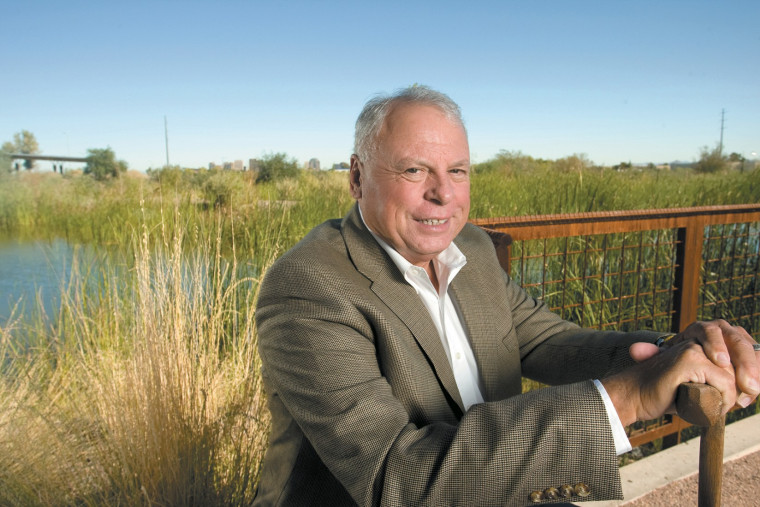2014 Outstanding Disabled Veteran of the Year
Open gallery

Roger Ferland BA ’68
by Pattie Pace
In 1970, Platoon Sgt. Roger Ferland was leading a patrol in the jungle near Da Nang, Vietnam. Moving stealthily through the brush, he heard an ominous click before an explosion blew him into the air. The blast severed both his legs and shattered his right arm.
In shock, but grateful to be alive, he made a quick assessment. “I knew that I could still be a lawyer and a father—and that I was going home,” says Ferland, who later received a Bronze Star with the “V” device (for combat-related valor), the Purple Heart, and the Combat Infantry Badge.
During months of intensive rehabilitation, he received encouragement from Sandy Green, the woman he’d met only briefly through his family, before heading to war. They had written daily letters while he was in combat and now exchanged audiotapes while he recovered. “When we saw each other again at the army hospital in Denver, we somehow knew we’d spend our lives together,” he says.
The couple married in 1971 and moved to Durham, North Carolina, where Ferland earned his law degree at Duke University. Together, they raised three daughters while he forged a 37-year career in environmental law.
Over the years, Ferland served as a vocal advocate for injured veterans. In August 2014, he received the 2014 Outstanding Disabled Veteran of the Year award from the Disabled American Veterans. The organization honored him for spearheading Arizona’s cost-free legal clinics, where veterans receive counseling in family law, estate planning, and landlord-tenant disputes.
At the awards ceremony in Las Vegas— the place his grieving family spent Christmas after Sandy died in 2012—Ferland made an impassioned plea: “Consider the benefits to improving the quality of leadership in this country by adopting a two-year requirement for mandatory public service for all Americans—after high school, but before college or joining the workforce.”
Ferland’s journey of self-discovery began when he left his home in Scottsdale, Arizona, and arrived by bus at Lewis & Clark College. A history major with a penchant for persuasion, he joined the forensics team at the behest
Now, two years into retirement, Ferland is having “second, third, and fourth thoughts” about leaving his career. He hopes to return to the law part time as a consultant.
In the meantime, he’s a committed volunteer. Once a week, he settles into a broadcast booth at Sun Sounds Foundation, using his deep “radio voice” to read magazines and newspapers for the visually impaired.
He also cochairs Audubon Arizona’s science and policy committee. While serving as board chair, he oversaw the creation of the Nina Mason Pulliam Rio Salado Audubon Center—a 600-acre park along the historic Salt River near downtown Phoenix. “We deliberately located it where underprivileged kids could put their hands in the mud and experience nature,” he says.
Ferland’s ability to focus on the beauty of nature in Vietnam—noticing little purple flowers as he trudged through rice paddies—helped him survive the inhumanities of war.
“Surviving,” he says, “taught me to value every minute of every day that I’m alive.” —by Pattie Pace of Barry Mount BA ’66. Decades later, their debate coach, Jean Ward, professor emerita of communication, nominated Ferland for the college’s 2013 Distinguished Alumnus Award. She noted that he’s often identified as “Arizona’s first green attorney.”
Ferland’s foray into environmental law began almost by chance. While studying for the bar, he worked on a successful Arizona gubernatorial campaign that eventually led to a job as senior counsel to the Attorney General’s Environmental Protection Section. ”I absolutely loved it. The federal structure was in place, but we negotiated the state’s Clean Air Act from scratch,” he says.
More L&C Magazine Stories
Lewis & Clark Magazine is located in McAfee on the Undergraduate Campus.
MSC: 19
email magazine@lclark.edu
voice 503-768-7970
fax 503-768-7969
The L&C Magazine staff welcomes letters and emails from readers about topics covered in the magazine. Correspondence must include your name and location and may be edited.
Lewis & Clark Magazine
Lewis & Clark
615 S. Palatine Hill Road MSC 19
Portland OR 97219

